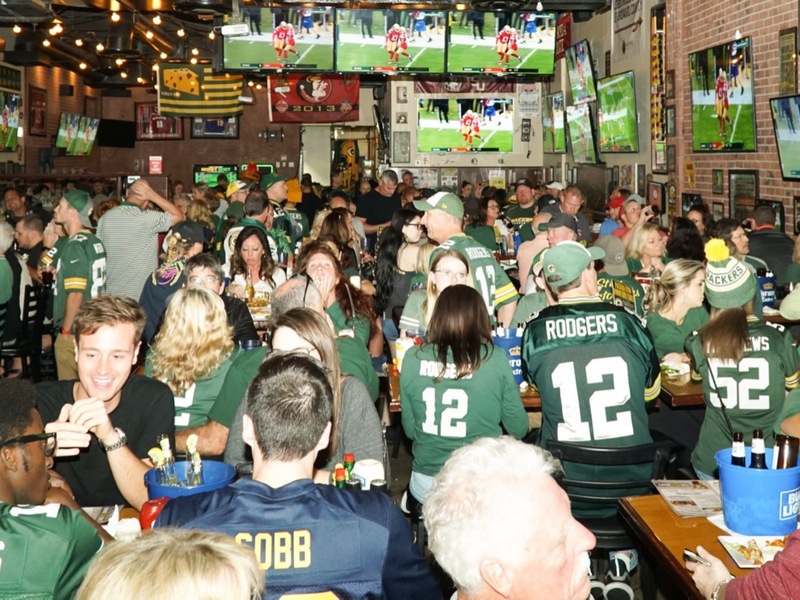On Sunday evening in Philadelphia, the Packers' slim playoff hopes were finally declared dead. Finished. Kaput. Over. Unfortunately, the same cannot be said of the team's season. There are still five long games left. And these facts lead me to just one conclusion: It's time to take a look at Aaron Rodgers.
Rodgers talk has grown louder and louder with each passing loss; some insane Packer backers were suggesting Rodgers should start over Brett Favre way back in September. Until now I haven't paid the discussion much mind, but it seems clear that the time has arrived. I understand the reasons, many emotional, that some holdouts use to argue against playing Rodgers. But at this point, the arguments no longer add up.
Before I get too far into those arguments, let me clarify what I mean by "it's time to take a look at Aaron Rodgers." I believe Favre should still start for the remainder of the year. His consecutive starts streak might be meaningless to the team's future, but Favre deserves to continue starting as long as he's the best quarterback on the team, which he is. But Mike Sherman should schedule playing time for Rodgers in each of the team's last five games, starting this week in Chicago. By the January 1 finale vs. Seattle, Rodgers should play at least an entire half of football.
I don't have a firm opinion on how the minutes should be split up; the coaching staff can figure that out. Next week, for example, Rodgers could play three defined series in the second and third quarters. In the following week, he might play the entire third quarter. Following that, perhaps he gets the full second quarter and half of the third. Specifics don't really matter -- these games are now exhibition contests for Green Bay, and they should be treated as such regarding Rodgers' development.
After all, why not play the rookie at this point? The primary argument I've heard against playing Rodgers is that the Packers would be a far worse team if Favre wasn't playing. OK, that's true; so what? That fact might have mattered when there was an outside chance at a miracle playoff run, but that chance no longer exists.
I'm not suggesting the Packers tank the last five games. I'm suggesting they start to look toward next year, which playing Rodgers does. And while I happen to believe that Favre will return as the starter in 2006, that doesn't mean playing Rodgers is pointless. If anything, it should help Rodgers make real progress during the off-season.
Whether or not to play a rookie quarterback is always a hot topic of debate. Troy Aikman pointed out Sunday that Cincinnati's Carson Palmer didn't play at all his rookie year and he turned out well, but Peyton Manning played every game his rookie year and he's turned out even better. Daunte Culpepper didn't play his rookie year, but Ben Roethlisberger did. And on and on; there's not a single winning formula for developing young quarterbacks.
There is always the "shell shocked" argument, the one that says tossing a rookie QB to the wolves could shatter his confidence permanently if things go poorly. Hogwash. If a professional quarterback has his confidence shattered by a few bad games in his rookie season, he probably isn't much of a professional quarterback.
Of course, the perfect example for the shell shocker backers can be found in next week's game in Chicago. Should Sherman dare allow Rodgers to play against the best defense in the NFL? What if the Bears shatter his confidence beyond repair?
Yes, Sherman should play Rodgers against the Bears, as long as he's rationale about it. Favre should start and play the majority of the game, including the fourth quarter. But Rodgers is a big boy, and he should be able to handle the mental aspect of playing a few series against the Bears. If not, let's find out.
Another argument against playing Rodgers is that the talent around him won't provide a fair shake for any long-term evaluation by the coaches. Again, so what? It's less than ideal that Rodgers' first playing time would be shared with the likes of Samkon Gado, Donald Lee and Andrae Thurman, but why should that preclude the Packers from giving it to him? The sad fact is that he may have to get used to playing with sub-par talent in Green Bay.
And while giving Rodgers a look now helps him prepare for 2006, it also helps the Packers prepare for the 2006 NFL Draft. It's looking more and more like Green Bay will have a top five pick, perhaps even as high as No. 2 (Houston may have squandered its last, best chance at a second win Sunday). As everyone knows, USC's Reggie Bush and Matt Leinart should be the top two players on the board. Assuming Bush goes to Houston, should the Packers consider Leinart, who many had atop their 2005 draft boards before he decided to stay for his senior year?
If Rodgers has some time under his belt, maybe that decision becomes a bit easier for Sherman and Ted Thompson to make. No, we won't be able to definitively judge Rodgers based on 10 quarters of work (which I'm suggesting he get), but we'll get a sense. If he leads a couple scoring drives against the Bears on Christmas Day, would you not feel more confident in his "heir apparent to Favre" status? Similarly, if he doesn't throw a TD pass in any game, does Leinart become more attractive? More information can only help Thompson make that decision.
Some may consider my stance too cautious. Why not start Rodgers now? Isn't Favre being selfish? If Rodgers is the future, let the future begin today. But I don't buy that line of thought, either. Beating the Bears would make a big difference in a terrible season, so Favre should get the vast majority of snaps next week. He also is still the best quarterback on the team and may return next year, so he doesn't need to step aside for anybody. He can and should, however, allow for the development of his backup while he retains his customary starter status.
In a painfully long season, what could be more sensible than that?
Sports shots columnist Tim Gutowski was born in a hospital in West Allis and his sporting heart never really left. He grew up in a tiny town 30 miles west of the city named Genesee and was in attendance at County Stadium the day the Brewers clinched the 1981 second-half AL East crown. I bet you can't say that.
Though Tim moved away from Wisconsin (to Iowa and eventually the suburbs of Chicago) as a 10-year-old, he eventually found his way back to Milwaukee. He remembers fondly the pre-Web days of listenting to static-filled Brewers games on AM 620 and crying after repeated Bears' victories over the Packers.







